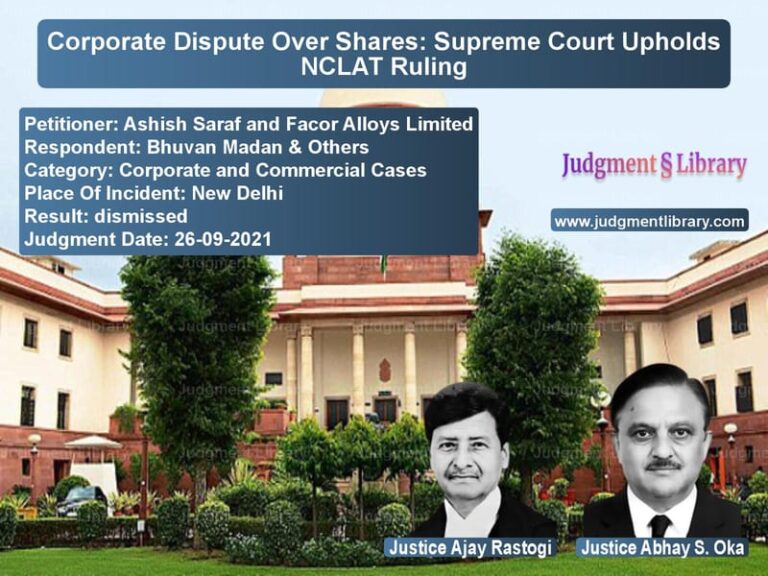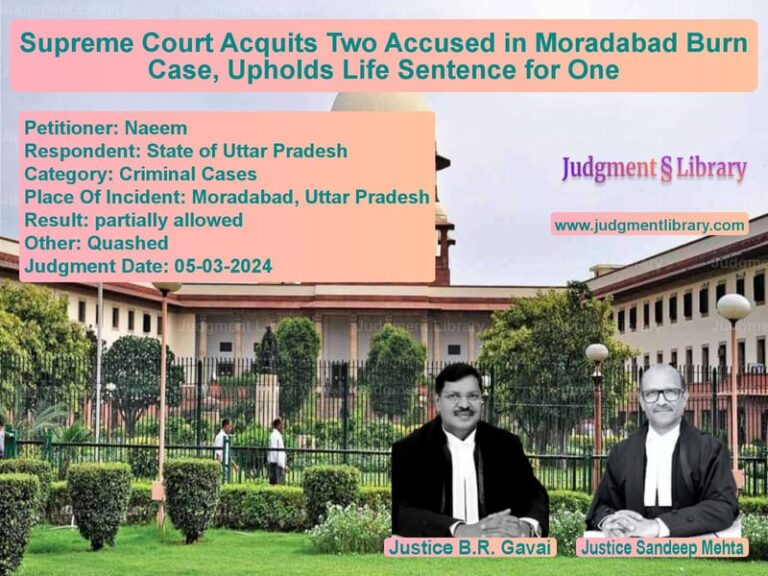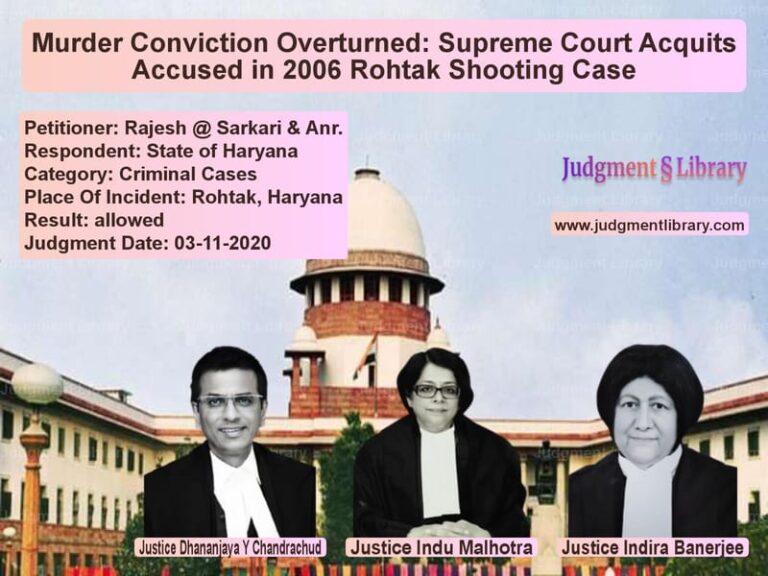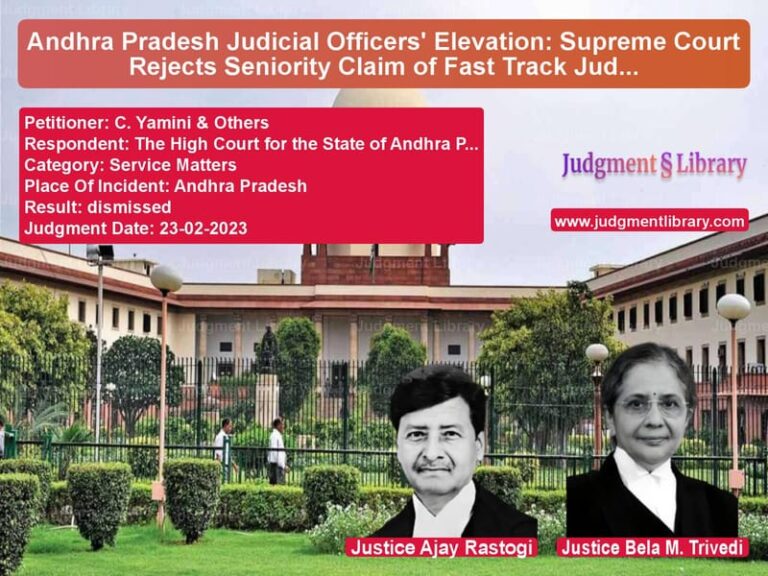Applicability of Limitation Act in Religious Endowment Appeals: Supreme Court Verdict Explained
The case of Ganesan vs. The Commissioner, Tamil Nadu Hindu Religious and Charitable Endowments Board brought before the Supreme Court revolved around a fundamental legal question—whether the Commissioner under the Tamil Nadu Hindu Religious and Charitable Endowments Act, 1959 (HR&CE Act) could condone delays in filing appeals under Section 69 of the Act by applying the Limitation Act, 1963. The Court was tasked with determining whether the Commissioner had the same status as a court and whether statutory provisions allowed the extension of the limitation period for appeals beyond the prescribed 60-day period.
Background of the Case
The appellant, Ganesan, had filed an application under Section 63 of the HR&CE Act, claiming his entitlement to Ambalam rights in a temple in Tamil Nadu. The Joint Commissioner of the HR&CE Board ruled in his favor on December 21, 2010, recognizing his Ambalam rights. However, this decision was challenged by a third party, P.R. Ramanathan, who filed an appeal with the Commissioner under Section 69 of the Act.
Ramanathan’s appeal was filed 266 days late, and he sought condonation of this delay by citing personal illness as the reason for not filing on time. The Commissioner condoned the delay and admitted the appeal. Ganesan challenged this decision in the Madras High Court, arguing that the Commissioner was not a court and, therefore, lacked jurisdiction to extend the limitation period beyond the statutory limit of 60 days. The High Court dismissed his challenge, prompting him to appeal to the Supreme Court.
Key Legal Issues
The Supreme Court had to determine:
- Whether the Commissioner under the HR&CE Act could be treated as a ‘court’ for the purpose of applying the Limitation Act.
- Whether Section 5 of the Limitation Act applied to appeals filed before the Commissioner under Section 69 of the HR&CE Act.
- Whether the statutory framework of the HR&CE Act permitted condonation of delays in appeals.
Arguments Presented
- Petitioner (Ganesan):
- The HR&CE Act provided a specific 60-day period for filing appeals before the Commissioner under Section 69, and there was no provision allowing an extension beyond this period.
- The Commissioner, unlike a civil court, was an administrative authority with quasi-judicial functions and could not apply the Limitation Act.
- Allowing the Commissioner to condone delays would go against the legislative intent of having fixed appeal timelines.
- Respondent (Ramanathan & HR&CE Board):
- The Commissioner functioned as a quasi-judicial body while hearing appeals and should be considered a court for procedural purposes.
- Since the HR&CE Act did not explicitly exclude the application of the Limitation Act, the Commissioner could exercise the power to condone delays.
- The appeal was delayed due to unavoidable personal health issues, and substantial justice should prevail over procedural technicalities.
Supreme Court’s Observations and Judgment
The Supreme Court ruled that the Commissioner was not a ‘court’ under the Limitation Act and, therefore, could not condone delays in appeals. The judgment explicitly stated:
“The Commissioner while hearing the appeal under Section 69 of the Act, 1959, is not a court. The provisions of the Limitation Act, 1963, do not automatically apply unless expressly provided in the statute.”
The Court analyzed the legislative intent behind the HR&CE Act and found that:
- The Act did not provide for condonation of delay in appeals before the Commissioner.
- Section 69(2) already granted the Commissioner suo motu powers to review orders even if no appeal was filed within the limitation period, indicating that the Legislature did not intend for Section 5 of the Limitation Act to apply.
- The Commissioner’s function remained administrative, and it lacked inherent judicial powers to extend the limitation period.
The Supreme Court ruled that the order condoning the delay was invalid and set aside the Commissioner’s decision, effectively dismissing Ramanathan’s appeal.
Analysis of the Legal Precedents
The Court referenced multiple previous judgments concerning the application of the Limitation Act in cases where tribunals and administrative authorities acted in a quasi-judicial capacity:
- It reaffirmed that the Limitation Act applies only to courts unless a specific statute expressly extends its provisions to quasi-judicial authorities.
- The Court examined cases where administrative bodies were treated as courts but found that the HR&CE Act did not provide such a designation for the Commissioner.
- Statutes prescribing fixed limitation periods must be followed strictly, especially when dealing with matters of public interest such as religious endowments.
Conclusion
This ruling reinforces the principle that statutory authorities cannot extend limitation periods unless explicitly authorized by law. The Supreme Court’s decision ensures that procedural timelines in religious endowment matters are strictly adhered to, preventing administrative authorities from overriding legislative intent. The judgment sets an important precedent, clarifying that quasi-judicial bodies must operate within the confines of the law and cannot assume powers not expressly granted to them.
Petitioner Name: Ganesan Rep By Its Power Agent G. Rukmani Ganesan.Respondent Name: The Commissioner, Tamil Nadu Hindu Religious and Charitable Endowments Board & Ors..Judgment By: Justice Ashok Bhushan, Justice K.M. Joseph.Place Of Incident: Tamil Nadu.Judgment Date: 03-05-2019.
Don’t miss out on the full details! Download the complete judgment in PDF format below and gain valuable insights instantly!
Download Judgment: Ganesan Rep By Its P vs The Commissioner, Ta Supreme Court of India Judgment Dated 03-05-2019.pdf
Direct Downlaod Judgment: Direct downlaod this Judgment
See all petitions in Legal Malpractice
See all petitions in Contract Disputes
See all petitions in Public Sector Employees
See all petitions in Judgment by Ashok Bhushan
See all petitions in Judgment by K.M. Joseph
See all petitions in allowed
See all petitions in supreme court of India judgments May 2019
See all petitions in 2019 judgments
See all posts in Civil Cases Category
See all allowed petitions in Civil Cases Category
See all Dismissed petitions in Civil Cases Category
See all partially allowed petitions in Civil Cases Category







